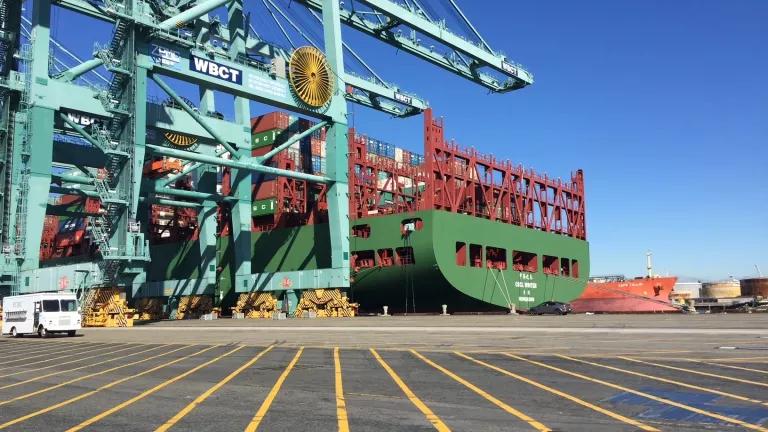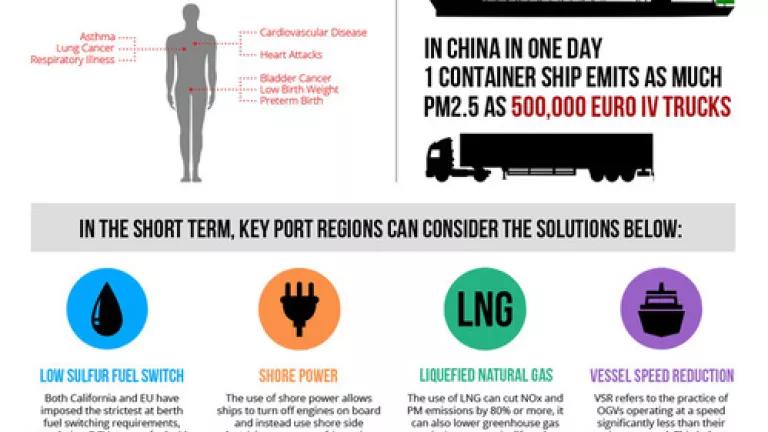
View from NRDC’s office in Beijing on January 29, 2013
One week ago, much of China was plagued by the worst air pollution in recent memory. The heavy smog that blanketed the country for five days was so extreme that it stirred up a media storm and even prompted state-run media to demand more action from the government. While some of the government’s emergency actions – shutting down factories and limiting the number of cars on the road – did help alleviate the pollution temporarily, Beijing’s Air Quality Index readings are back to hazardous levels and nearly off the charts again as I write this. China must take more aggressive, long-term steps to address the root causes of its poor air quality in order to create lasting impact.
One major contributing factor to China’s urban air pollution is emissions from dirty diesel vehicles, including trucks, locomotives and ships, as well as construction and agricultural equipment. Studies suggest that vehicle emissions contribute more than 70% of NOx in downtown Beijing and are the dominant source of roadside PM2.5. Particulate matter is the most dangerous pollutant to human health, as it can get lodged within the lungs and contribute to health risks such as cancer, asthma, heart attacks, respiratory diseases, and premature deaths. In fact, the Health Effects Institute recently completed a systematic analysis that ranked outdoor air pollution (in the form of fine particulates) the fourth largest cause of death in East Asia (China and North Korea), with 1.2 million premature deaths attributed to PM pollution in 2010.
Dirty diesel is also a major environmental hazard, resulting in 20 to 25 percent of the world’s black carbon. Black carbon is the second most powerful man-made contributor to global warming, accelerating the melting of Arctic ice and mountain glaciers worldwide, and has recently been found to contribute to climate change twice as much as previously estimated. Reducing sulfur levels in diesel fuel, introducing stronger emissions standards that would introduce cleaner diesel technologies, and taking steps to accelerate the clean-up of the dirty diesels in China’s growing cities would benefit both public health and climate change. China can tackle its dirty diesel fuel problem by setting strict fuel quality and vehicle emission standards. Studies show that moving to the next stage of diesel fuel and emission standards at the national level (equivalent to the Euro IV standards) would reduce particulate matter (PM) by 80% and NOx by 30%.
Cities can move even faster. Beijing is the only city in China with vehicle emission and fuel quality standards that are as stringent as European levels. In 2012, Beijing adopted municipal China V standards, which is equivalent to the Euro V standards, capping sulfur levels at 10 parts per million. For context, the US has capped sulfur levels at 15ppm, which has reduced particulate emissions by over 90% and will prevent some 26,000 premature deaths a year.

Around 40% of China’s transportation fuel mix comes from diesel
Unfortunately, national fuel standards in China have lagged behind those in Beijing, hovering at China III standards (350ppm or higher). China originally promised to enact stronger diesel fuel standards by adopting China IV for new busses and trucks by January 2011, but has delayed issuing the standards twice, most recently to July 2013, claiming that higher-quality fuel is not yet widely available. Switching to higher-grade fuel would impose an estimated 20-30 billion Yuan ($3.2 - $4.8 billion) of extra costs on oil companies in China. Yet these costs need to be balanced against the real costs of delay in terms of public health impacts. According to the International Commission on Clean Transportation, delaying the standards creates an additional half a million tons of NOx and 30,000 tons of PM emissions a year.
NRDC has been working to phase out dirty diesel fuel worldwide for the past two decades, and our work has shown that the benefits of this clean-up far outweigh the implementation costs. Through NRDC’s work with the Partnership for Clean Fuels and Vehicles, many large cities in developing nations, including Beijing, now offer ultra-low sulfur fuel. But to really solve the dirty diesel problem, China must take steps to clean up its diesel fuel and vehicles nationwide in order to reduce air pollution, protect the health of its citizens, and curb global warming.
This blog was coauthored with my colleague Christine Xu and my former colleague Rich Kassel (now with Gladstein, Neandross & Associates).



